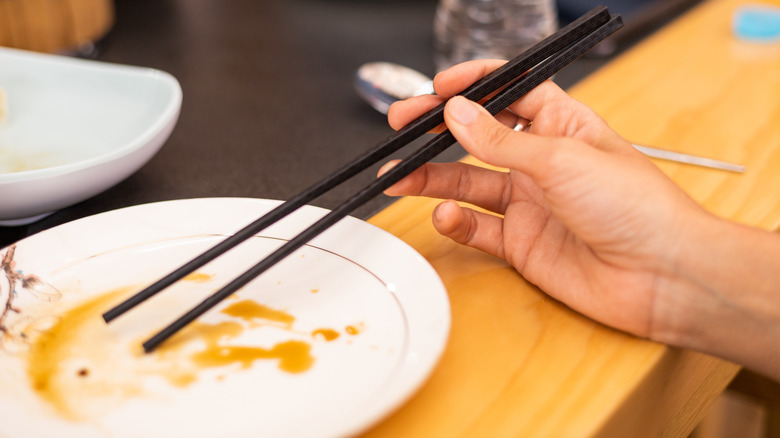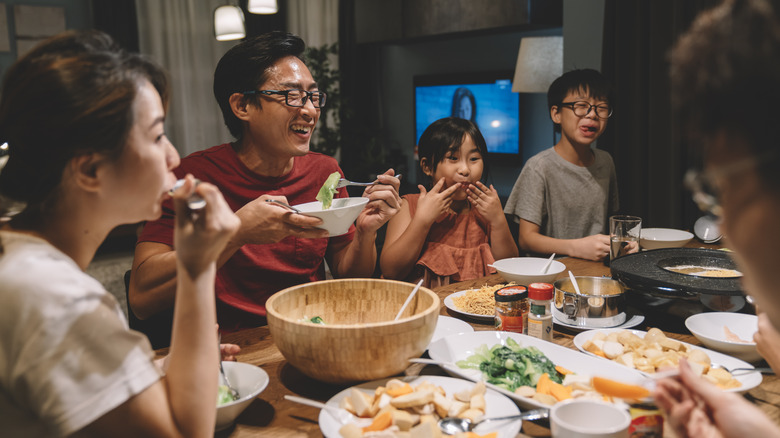The Unexpected Reason To Avoid Joining The Clean Plate Club On A Trip To China
Travel planning doesn't begin and end with sorting your documents, securing visas, and packing your suitcase — including attempting to fit everything into only one carry-on. It also involves coming to grips with a locale's customs and etiquette, especially if you're a foodie wishing to have authentic dining experiences. Beyond finding the best local eateries, schooling yourself in the do's and don'ts of local dining etiquette is just as important. That is, unless you want to be that tourist.
In Georgia, for instance, CNN notes that locals don't appreciate it when you sip wine at traditional feasts and would rather you chug your glass in one fell swoop. It's apparently a no-no to eat tacos in Mexico with anything other than your hands. And in China, cleaning your plate is the fastest way to insult your host. No matter how much you enjoyed the meal, it's a must to put at least some crumbs behind.
Now, it may sound odd to leave food on your plate. In fact, in places like Japan, an empty plate signals your appreciation of the meal, per Japan Talk. Refusing to join the clean plate club is seen as wasteful, reflecting the cultural emphasis on avoiding waste. In contrast, in China, cleaning your plate is a rookie mistake, suggesting that your hosts did not provide enough food. When you leave some behind, however, it is deemed as a compliment, implying that the meal was more than generous. However, context also matters.
It still depends on the situation
Just as it is considered rude to tip in most places in Japan, it is also considered disrespectful to lick your plate clean in China — at least half the time. It entirely hinges on where you're dining. The rule, as it turns out, shifts between being a guest in a home and eating out at a restaurant.
When you're dining out, and you're footing the bill, there's an expectation that you have to finish everything to avoid waste. When you're a guest at someone else's place? That's a different story. "It's true only if you are visiting someone's home," one Reddit user noted. "They would offer you more food if you polish your plate." On the flip side, if you're dining on someone else's dime, particularly during business or celebratory meals, leaving a bit behind is the polite thing to do, as it shows the host was generous enough to over-provide. In fact, it's even common practice to order more food even if everyone is stuffed. "Ordering excessive amount of food is for them is showing hospitality and wealth," another user explained.
If you ever find yourself unsure of the dinner rules while visiting China, it might be wise to just ask before you dive in. As one Reddit user advised, "Best idea is before going to dinner or drinks ask your friend or the host what the cultural rules are that you need to follow so you don't piss anyone with status off."
A lowdown on Chinese dining etiquette
Just when you thought it was tricky enough to decide whether to leave a little food on your plate in China, there's a whole list of other dining rules that might just make your head spin. A viral TikTok by @candiselin86 explains a number of them, some of which might take you some time to get used to. For starters, don't even think about digging in until an elder gives the green light. And when you're serving yourself, remember that you must first stick to the dishes within arm's reach. Also — and this is a no-brainer — only use the communal chopsticks provided for serving yourself. Your personal pair? They stay out of the shared dishes. Oh, and when you're dining out and it's time to pay up? "You must fight for the bill even if you don't want to pay," they said.
How about liquor, you ask? If you're not one to hold your alcohol, you must make it known right away, unless you want to spend the next day nursing a bad hangover. "If you do not drink or have a low resistance, as I do... You must indicate that immediately, even stretch the truth and say you have a medical condition, otherwise you're in for the long haul," Eden Collinsworth, author of the book "I Stand Corrected: How Teaching Western Manners in China Became Its Own Unforgettable Lesson," told The New York Times. "They are promiscuous toasters."

